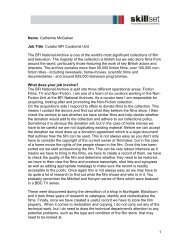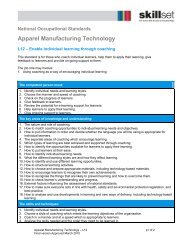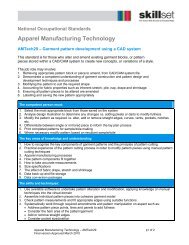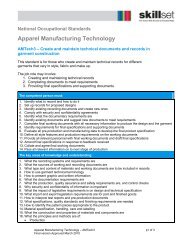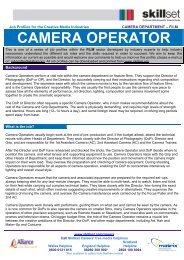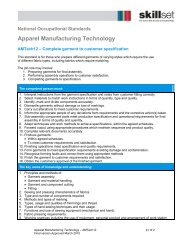Publishing in the Knowledge Economy - DTI Home Page
Publishing in the Knowledge Economy - DTI Home Page
Publishing in the Knowledge Economy - DTI Home Page
You also want an ePaper? Increase the reach of your titles
YUMPU automatically turns print PDFs into web optimized ePapers that Google loves.
<strong>Publish<strong>in</strong>g</strong> <strong>in</strong> <strong>the</strong> knowledge economy<br />
Issues for competitiveness<br />
practice <strong>the</strong>y are global/US players. Even<br />
Cambridge University Press operates equally<br />
from <strong>the</strong> US and <strong>the</strong> UK, although its activity is<br />
more on <strong>the</strong> book side. Pearson’s centre of<br />
gravity is also <strong>in</strong>creas<strong>in</strong>gly <strong>in</strong> <strong>the</strong> US. The issues<br />
specifically affect<strong>in</strong>g <strong>the</strong> education and research<br />
market are exam<strong>in</strong>ed <strong>in</strong> <strong>the</strong> next section.<br />
Digital technologies such as remote short run<br />
pr<strong>in</strong>t<strong>in</strong>g are open<strong>in</strong>g up o<strong>the</strong>r <strong>in</strong>ternational<br />
market opportunities for newspapers and<br />
magaz<strong>in</strong>es, while <strong>the</strong> Internet has exposed all<br />
publishers to a degree of potential competition<br />
<strong>in</strong> <strong>the</strong>ir domestic markets and <strong>the</strong> possibility of<br />
an <strong>in</strong>ternational audience.<br />
Drivers for <strong>in</strong>ternational expansion<br />
The growth of middle classes with higher<br />
disposable <strong>in</strong>comes <strong>in</strong> many parts of <strong>the</strong> world<br />
where English is widely understood, toge<strong>the</strong>r<br />
with <strong>the</strong> demand for learn<strong>in</strong>g <strong>the</strong> English<br />
language <strong>in</strong> new regions, such as <strong>the</strong> former<br />
Soviet republics <strong>in</strong> Central Asia, is open<strong>in</strong>g up<br />
new markets to British publishers. The market<br />
opportunity is most obvious for English<br />
Language Teach<strong>in</strong>g (ELT) materials, but<br />
<strong>the</strong>re will <strong>in</strong>creas<strong>in</strong>gly be demand for o<strong>the</strong>r<br />
types of books.<br />
It also appears that <strong>the</strong> grow<strong>in</strong>g market for<br />
books <strong>in</strong> English with<strong>in</strong> <strong>the</strong> EU, where English is<br />
<strong>in</strong>creas<strong>in</strong>gly <strong>the</strong> favoured second language, is<br />
benefit<strong>in</strong>g UK exporters more than those from<br />
<strong>the</strong> US. East and Central Europe, which <strong>in</strong><br />
Table 15.1 <strong>in</strong>cludes Russia and Turkey, has<br />
also been a major growth area for book exports<br />
from <strong>the</strong> UK.<br />
These figures must be accompanied by<br />
various caveats about <strong>in</strong>terpretation. As<br />
mentioned <strong>in</strong> <strong>the</strong> section on statistical analysis<br />
above, <strong>the</strong> book <strong>in</strong>dustry is <strong>in</strong>creas<strong>in</strong>gly<br />
localis<strong>in</strong>g production, directly or under licence.<br />
Therefore it should not be concluded from <strong>the</strong>se<br />
numbers that sales of books by UK publishers<br />
<strong>in</strong> some markets, such as Australia and New<br />
Zealand, have actually decl<strong>in</strong>ed <strong>in</strong> this period.<br />
Although <strong>the</strong>se markets have been particularly<br />
adversely affected by sterl<strong>in</strong>g’s relative strength,<br />
<strong>the</strong>y are also areas where UK publishers are<br />
<strong>in</strong>creas<strong>in</strong>gly publish<strong>in</strong>g via subsidiaries because<br />
of changes <strong>in</strong> respect of territorial copyright<br />
(see below).<br />
Magaz<strong>in</strong>es and newspapers<br />
With<strong>in</strong> advanced markets, <strong>the</strong> existence of highspeed<br />
networks has facilitated remote pr<strong>in</strong>t<strong>in</strong>g <strong>in</strong><br />
general, and short-run digital pr<strong>in</strong>t<strong>in</strong>g now opens<br />
up <strong>the</strong> possibility of economically servic<strong>in</strong>g small<br />
groups of readers overseas. This applies both to<br />
bus<strong>in</strong>ess media, such as specialist bus<strong>in</strong>ess<br />
magaz<strong>in</strong>es, and more general newspapers<br />
targeted at travell<strong>in</strong>g UK citizens, which are<br />
currently distributed often very late and<br />
expensively, or are unobta<strong>in</strong>able. Associated<br />
Newspapers envisages a situation where<br />
travellers may order a specially customised<br />
edition, which will be delivered to a pr<strong>in</strong>ter<br />
located <strong>in</strong> <strong>the</strong>ir hotel, and be will<strong>in</strong>g to pay<br />
a premium price for it.<br />
Format sales and <strong>in</strong>ternational launches<br />
There has long been an <strong>in</strong>ternational trade <strong>in</strong><br />
magaz<strong>in</strong>e formats, with many cross<strong>in</strong>g <strong>the</strong><br />
Atlantic and some arriv<strong>in</strong>g from Australia and<br />
Germany. There appear to be no numbers<br />
record<strong>in</strong>g net or gross revenues from this trade<br />
Figure 15.2 Sales of books, schools and ELT,<br />
ex-warehouse prices, £m<br />
300<br />
250<br />
200<br />
150<br />
100<br />
50<br />
1990<br />
1992<br />
Source Publishers’ Association<br />
• School and ELT, home • School and ELT, export<br />
1994<br />
1996<br />
1998<br />
90




